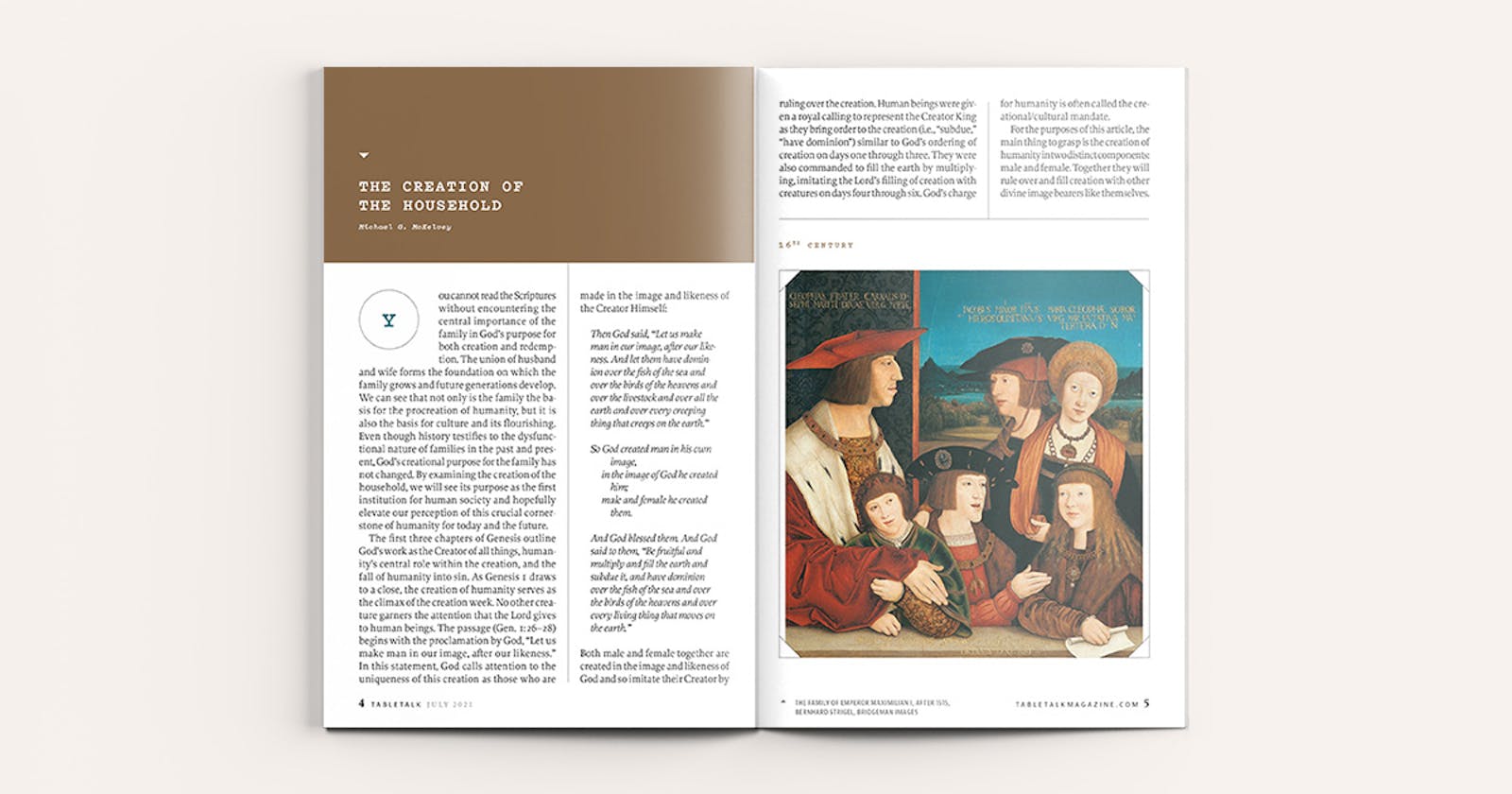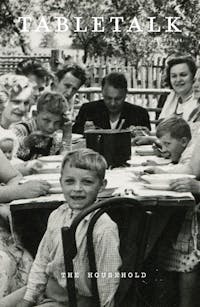
Request your free, three-month trial to Tabletalk magazine. You’ll receive the print issue monthly and gain immediate digital access to decades of archives. This trial is risk-free. No credit card required.
Try Tabletalk NowAlready receive Tabletalk magazine every month?
Verify your email address to gain unlimited access.
You cannot read the Scriptures without encountering the central importance of the family in God’s purpose for both creation and redemption. The union of husband and wife forms the foundation on which the family grows and future generations develop. We can see that not only is the family the basis for the procreation of humanity, but it is also the basis for culture and its flourishing. Even though history testifies to the dysfunctional nature of families in the past and present, God’s creational purpose for the family has not changed. By examining the creation of the household, we will see its purpose as the first institution for human society and hopefully elevate our perception of this crucial cornerstone of humanity for today and the future.
The first three chapters of Genesis outline God’s work as the Creator of all things, humanity’s central role within the creation, and the fall of humanity into sin. As Genesis 1 draws to a close, the creation of humanity serves as the climax of the creation week. No other creature garners the attention that the Lord gives to human beings. The passage (Gen. 1:26–28) begins with the proclamation by God, “Let us make man in our image, after our likeness.” In this statement, God calls attention to the uniqueness of this creation as those who are made in the image and likeness of the Creator Himself:
Then God said, “Let us make man in our image, after our likeness. And let them have dominion over the fish of the sea and over the birds of the heavens and over the livestock and over all the earth and over every creeping thing that creeps on the earth.”
So God created man in his own image,
in the image of God he created him;
male and female he created them.
And God blessed them. And God said to them, “Be fruitful and multiply and fill the earth and subdue it, and have dominion over the fish of the sea and over the birds of the heavens and over every living thing that moves on the earth.”
Both male and female together are created in the image and likeness of God and so imitate their Creator by ruling over the creation. Human beings were given a royal calling to represent the Creator King as they bring order to the creation (i.e., “subdue,” “have dominion”) similar to God’s ordering of creation on days one through three. They were also commanded to fill the earth by multiplying, imitating the Lord’s filling of creation with creatures on days four through six. God’s charge for humanity is often called the creational/cultural mandate.
For the purposes of this article, the main thing to grasp is the creation of humanity in two distinct components: male and female. Together they will rule over and fill creation with other divine image bearers like themselves. There is absolute equality, dignity, and worth in both male and female since they both bear the image of God. Neither one is more important than the other, and neither can exist without the other. However, this passage raises the question: How will they order and fill the creation together?
Genesis 2 quickly responds to that concern. God forms man from the dust of the earth and puts him into a specially ordered place within the creation to enjoy the presence of his Creator King (2:5–15). After the Lord enters into a special covenant with the man (vv. 16–17), we read something that should shock us. After almost every day of the creation week, the statement is made, “And God saw that it was good” (e.g., 1:4, 10, 12, 18). After the creation of mankind on the sixth day, God saw that it was “very good,” signifying that man and woman are the crown of creation (v. 31). But when God puts the man into the garden in Genesis 2, the Lord God says, “It is not good for the man to be alone” (v. 18, emphasis added). This first negation of the term “good” in the Bible pertains to the man’s being alone. What? How could God’s evaluation of His good creation contain a negative expression?
The narrative of Genesis 2 intends to show us that without woman, mankind and creation itself are incomplete. In His wisdom, the Lord shows this to the man. He does so by bringing the animals before Adam to name them, but that is not all God is doing. The Lord is revealing to the man that the animals exist in pairs (male and female), but he does not have a “helper” suitable or fit for him. Notably, God shows the man his need so that when God meets that need, he will glory in the creation of woman. It is crucial to understand that the Hebrew term for “helper” (2:18, 20) does not convey inferiority or servitude; it conveys need. Man needs someone to help him carry out God’s creation mandate. The same term occurs elsewhere referring to God as the “helper” of Israel (e.g., Hos. 13:9). So instead of the notion of being a slave or servant, woman as helper means she occupies a place of honor and purpose. Man needs help, for he cannot fulfill his mission alone. As Yahweh creates the woman out of the rib of the man, He shows that she fulfills the needs of man. She wonderfully corresponds to the man and brings to completion the creation of humanity. She is the same as him and yet beautifully different. Adam sees this right away as he speaks the first recorded words of humanity in the Bible (Gen. 2:23), and it is a love poem. After this marriage, verse 24 provides a decree: “Therefore a man shall leave his father and his mother and hold fast to his wife, and they shall become one flesh.” This has always been understood as the institution of the marriage ordinance. As the first established relationship within the social construct of humanity, marriage serves as the foundation of all human communities. Without this ordinance, there would be no foundation for united societies or for the carrying out of the creation mandate. Human beings actually subvert God’s purposes for mankind and creation itself when the institution of marriage is undermined.

Genesis 3 reveals this. When the serpent achieves his goal of corrupting God’s good creation, he does so by undermining the roles of husband and wife in marriage. The deceiver goes to the helper instead of the “head,” cleverly getting Adam to listen to the voice of his wife instead of the voice of God (v. 17). This is the first undermining of the marriage covenant as the serpent approaches humanity, contradicting the created order of “head/helper.” One of the first things we see when Adam breaks the covenant is how sin immediately affects marriage. Both man and woman are filled with shame before God and each other, and they blame others for what has happened. Adam blames both the woman and God for his own choice. Then the woman blames the serpent. Dysfunction has entered marriage. The fall results in the cursing of the serpent and the promise that from the seed of the woman a redeemer will come. But the punishment of the woman and the man will dramatically affect their marriage, their family, and all humanity’s endeavor to carry out the creation mandate. Sin twisted the dynamics of the family. We need only to look at the next chapter to see how sin immediately changes the dynamics of the family; Cain kills his brother and shows no remorse for his actions. What does this show us? Humanity is divided when members of the immediate family turn against each other.
Numerous examples from Scripture and history could be given to show how familial division brings chaos to society. But as bad as this division is, Christ has brought redemption and renewal to the family. The grace and mercy of God change the hearts of husbands and wives to pursue love, unity, forgiveness, and worship as a family. When there is a unified marriage, the entire family has a security that cannot be found anywhere else. This security typically brings stability to families, which contributes to the stability of society. The Apostle Paul expresses this in a lengthy treatment of the family in Ephesians 5–6. Importantly, this will never “fix” family problems in this world. Sin will always affect both families and society until Christ returns. But the more we manifest the love of Christ in our families, the more the love of Christ will be seen in the world.
There is one final thing worth considering. What about those without families: the orphan, the widow, the sojourner, and the unmarried? First, it is vitally important to understand that to be a person living in that context is not wrong and does not lessen the dignity, value, and honorable position of a person in the community, especially in the church. People are not outcasts because they are single (1 Cor. 7), orphaned, widowed, divorced, or separated from family due to location. Christians should never treat them as inferior or incomplete because they may be without an immediate family. Instead, they should be respected, loved, and incorporated into the local family of God and individual families. The Bible, both the Old and New Testaments, never marginalizes these individuals, but rather it reaches out to include them and care for them in the context of God’s own family.
